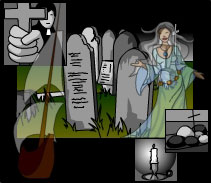December Reading Tip: Ghosts in the Library
Created | Updated Nov 30, 2014
December Reading Tip: Ghosts in the Library

The other day, Elektra and I got to talking about one of our favourite subjects: h2g2ers. More specifically, British h2g2ers, and what we learn from them. Elektra's been perplexed and delighted by Brit behaviour ever since the time, years ago, when a UK librarian colleague sent her a letter with the promise to 'circularise' the group membership. She wrote back and asked if he planned to make them round, or just force them to sit in a ring. Anyway…back to the other day.
'Why,' demanded Elektra, 'do the Brits tell ghost stories at Christmas? It's weird.'
'I'm not sure,' I confessed. 'Maybe they were influenced by Dickens. After all, 'A Christmas Carol' is a ghost story, of sorts.' But it does strike us as strange that people in the UK enjoy telling spooky stories on Christmas Eve, a time we in the US usually reserve for heartwarming drama. Mind you, our heartwarming drama may contain elements of magical realism, but none of our favoured elves, sprites, fairies or angels would dare to frighten even the most skittish child. We're family-friendly, this time of year. We get our ghost stories out of our systems on 31 October.
Be that as it may, the discussion set me to searching, and I discovered something wonderful on the old internet: the short stories of MR James. Apparently James, a Cambridge scholar of some note and later official at Eton, made up these tales to read by the fire to his guests on Christmas Eve. So the custom of ghost stories at Christmas goes back at least to the late 19th Century. James' stories must have been well received: I can't imagine anything more delightful than sitting by a fire, over a hot drink, and listening to a good friend read one of these stories aloud. They're amazingly entertaining.
James is justly famous as a pioneer in the modern ghost story – as opposed to the Gothick variety, with its mad baronets and haunted stately homes. I was prepared for this, but not for the amount of scholarship that was in evidence. Now, you know me: I'm a sucker for that kind of thing. I don't want the writer to make up the Curse of Amenwhatsit. I want him to quote me chapter and verse of some real Egyptian saga, and tack his ghost tale onto that. James is a treasure trove if you love trivia and puzzles (looking at you, Icy North). Not only does he make up a scary yarn about the secret treasure hidden in the old well in a German cathedral village, but he bases it on original research he did himself, involving stained glass windows that ended up on a private English estate. Then, of course, he tacks on a secret code in Latin, and the result is absorbing. Take that, Dan Brown. All these later writers are just copycats, and lazy ones, at that.
James' 'heroes' are nerds – think Johnny Depp in The Ninth Gate. But they are brave nerds. They may be frightened by the ghost in the crypt/haunted curtains/evil talisman, but they act decisively and with meticulous footnoting, just like Guide Researchers. And they never pull any of those stupid human tricks favoured in bad horror movies: they don't go into the basement alone, they never split up, and they always leave well alone. Stephen King would do well to learn from MR James: it is not necessary to have the monster reach a scaly hand from beyond the grave on the last page. Nossir. A good Cambridge scholar knows how to put these ghost johnnies in their place. And they stay put.
One of the best tales is a long shaggy-dog story called 'The Tractate Middoth'. It has a lot to do with accession numbers, and I haven't seen so much supernatural carry-on in a library since the first Ghostbusters movie… You're sure to enjoy these, with or without a fire. Just stroll on over to the Gutenberg online editions listed below. And let me know if you thought these were as much fun as I did.
Where to Find MR James Stories Online
Ghost Stories of an Antiquary, Part I.
Ghost Stories of an Antiquary, Part II.
Writing Right with Dmitri Archive
